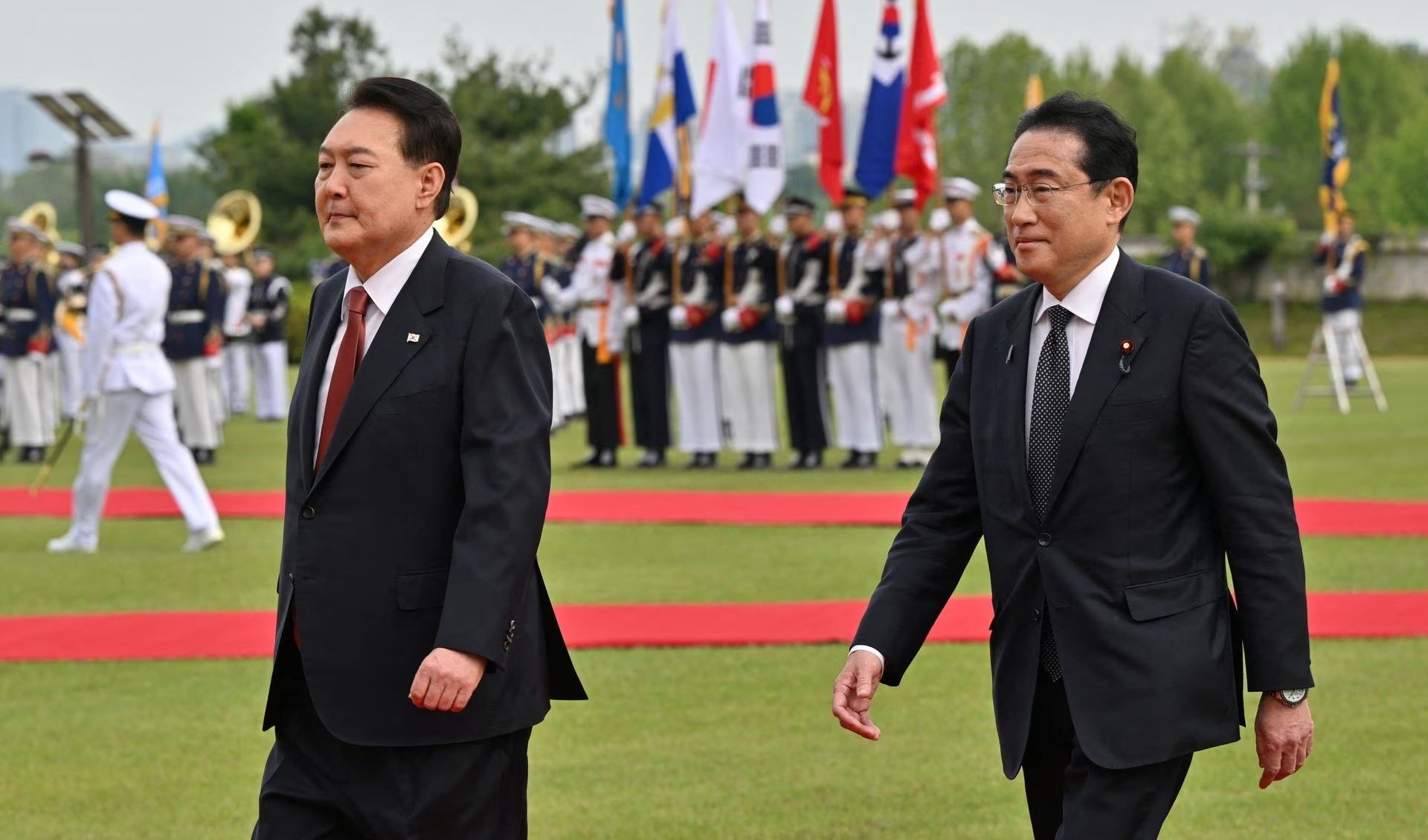Kishida avoids direct apology to Korean victims after Seoul summit
Ever since offering compensation for those affected by Japan's colonial past, Yoon has faced domestic criticism.
-

South Korean President Yoon Suk Yeol walks alongside Japanese Prime Minister Fumio Kishida in a welcoming ceremony in Seoul, South Korea, 7 May 2023. (Reuters)
Japan’s Prime Minister Fumio Kishida conveyed his sympathy for forced Korean laborers during Japan's colonial rule over the country during a summit held with South Korean President, Yoon Suk Yeol, which comes in the context of a political alliance to counter alleged nuclear threats from the Democratic People's Republic of Korea (DPRK).
In his statement, Kishida shared his feeling regarding the issue, saying that he felt a "strong pain" when thinking of "the extreme difficulty and sorrow that many people had to suffer under the severe environment in those days," while he made sure not to issue a direct apology for his nation's actions during the colonial era, which lasted from 1910 to 1945.
"Japan and South Korea share various history and development, and I believe it is my responsibility as Prime Minister of Japan to cooperate with President Yoon and the South Korean side as we follow through the effort of our predecessors who have also overcome the difficult times," said Kishida as he eyes maintaining the improved diplomatic trend between the two governments.
Kishida arrived in South Korea earlier Sunday for a two-day visit to the country, which marks the second Japanese-SouthKorean as the top officials met earlier in Tokyo in March, making the exchanged visits of the two leaders the first in 12 years.
The meetings came in part to resolve tensions, which boiled over, after a 2018 South Korean ruling, which mandated that Japanese companies financially compensate workers of the colonial era.
In March this year, Yoon's government announced a plan to pay those impacted in a bid to calm disputes between the Asian countries without Tokyo's direct involvement -- a move that angered much of the South Korean public.
Tokyo maintains that the 1965 treaty, which saw Japan's reestablishment of diplomatic ties with South Korea after a reparations package totaling roughly $800 million in grants and low-interest loans, was agreed upon to resolve all disputes dating to the pre-1945 period.
Victims condemn rapprochement
The unilateral decision of South Korea to financially settle the dispute was welcomed by Tokyo's government, however, the policy was heavily criticized by forced labor victims and political rivals, who stuck by their demand of pushing Japanese companies to pay fair compensation to those affected.
Yang Geum-Deok, who worked at a Mitsubishi factory at the time, said at a rally in Seoul, "I am 95 years old and I don't know if I die today or tomorrow. But never in my life have I felt so distressed."
"Even if I die of hunger, I would not accept that dirty money," she said as he held a poster that read, "Mitsubishi must apologize and compensate!"
Close to 780,000 Koreans were forced into labor by Japan during the colonial period, according to Seoul - this number does not include the hundreds of women forced into sexual slavery by the Japanese army at the time.
At the rally, victim Kim Sung-Joo said, "It was the Japanese who dragged us to Japan. Who do we turn to demand an apology?"
On the other hand, Kishida has echoed previous official Japanese positions, including the 1998 joint declaration on improving ties, which excluded a formal apology as Keizo Obuchi, the Prime Minister at the time, said "I feel acute remorse and offer an apology from my heart."
"Kishida’s comments about Koreans who suffered under Japanese colonialism may be criticized for not being more specific about historical perpetrators and more apologetic toward historical victims," said Leif-Eric Easley, a Professor at Ewha University in Seoul. "But Kishida did visit South Korea’s national cemetery and said that his heartfelt views, respect for the past, and recognition of current global challenges produce a sense of responsibility for improving Seoul-Tokyo relations."

 4 Min Read
4 Min Read








